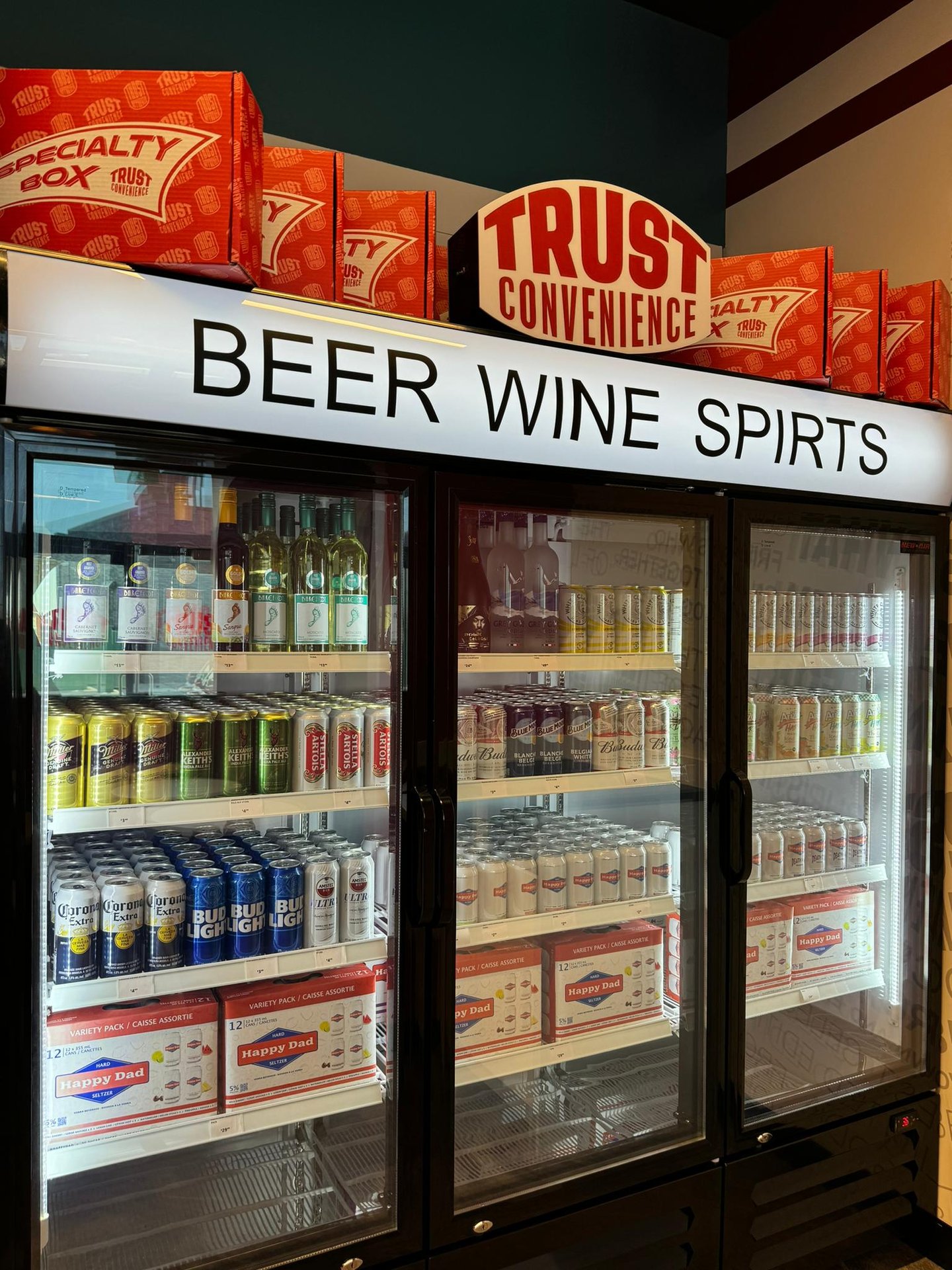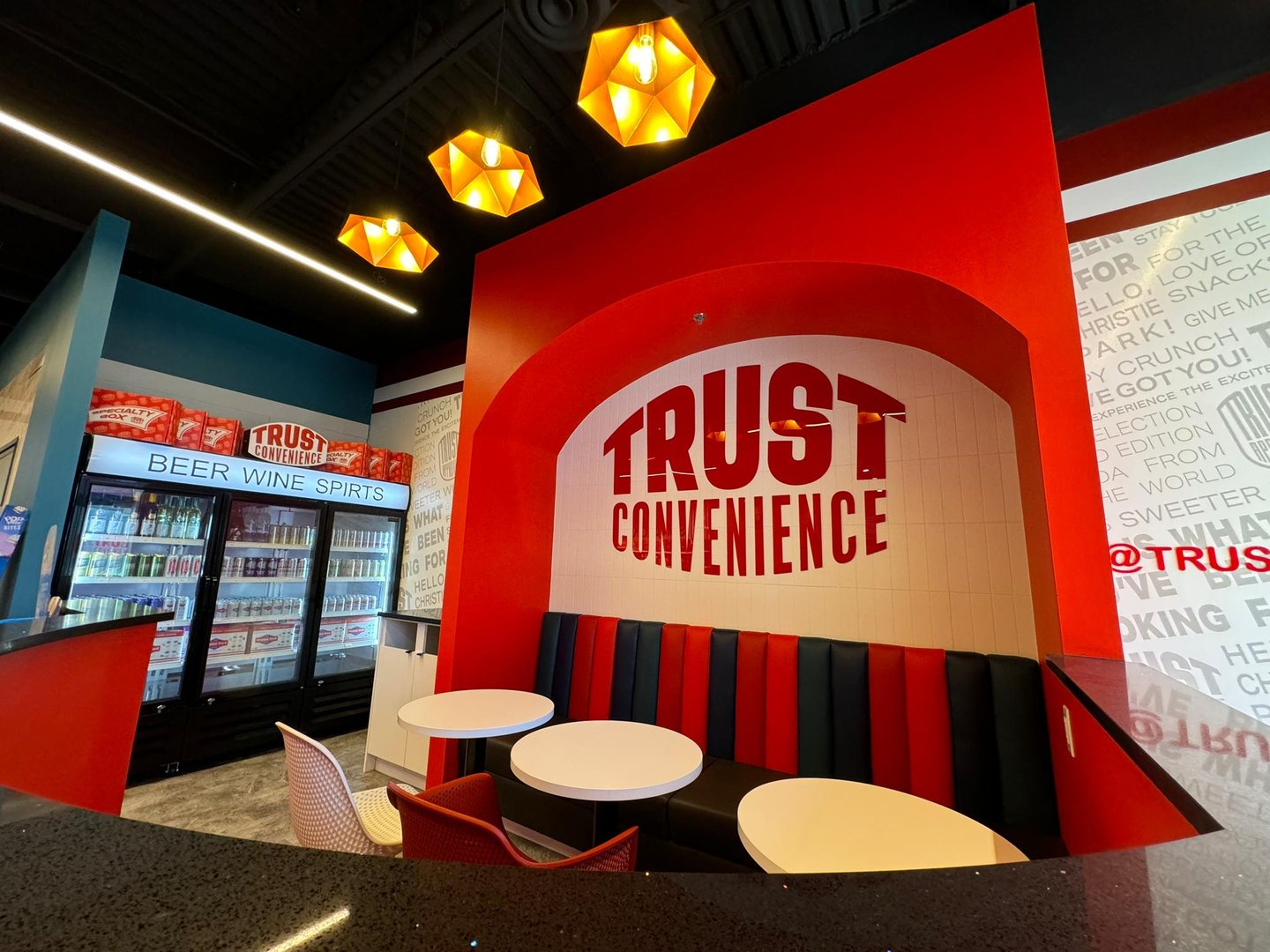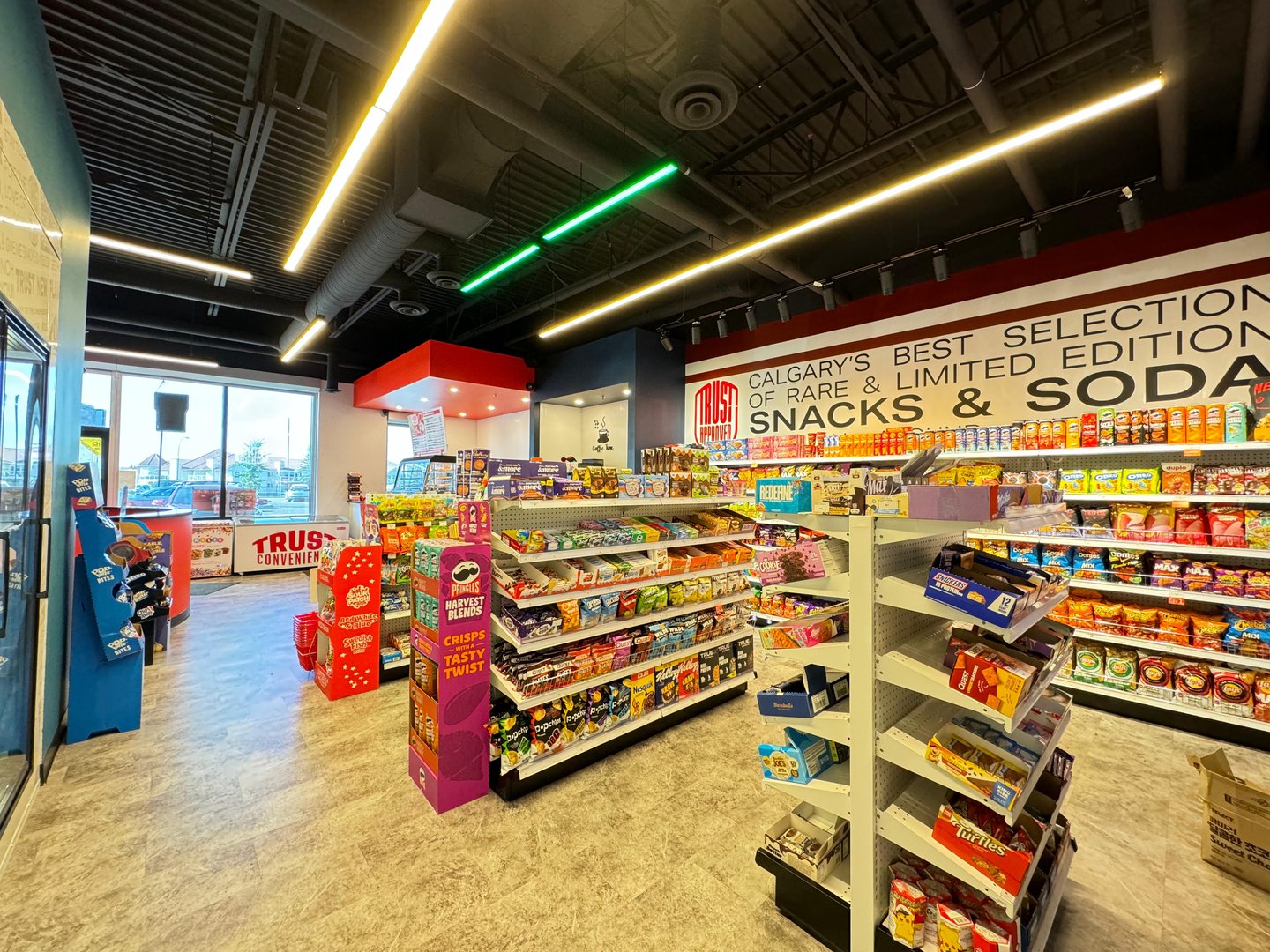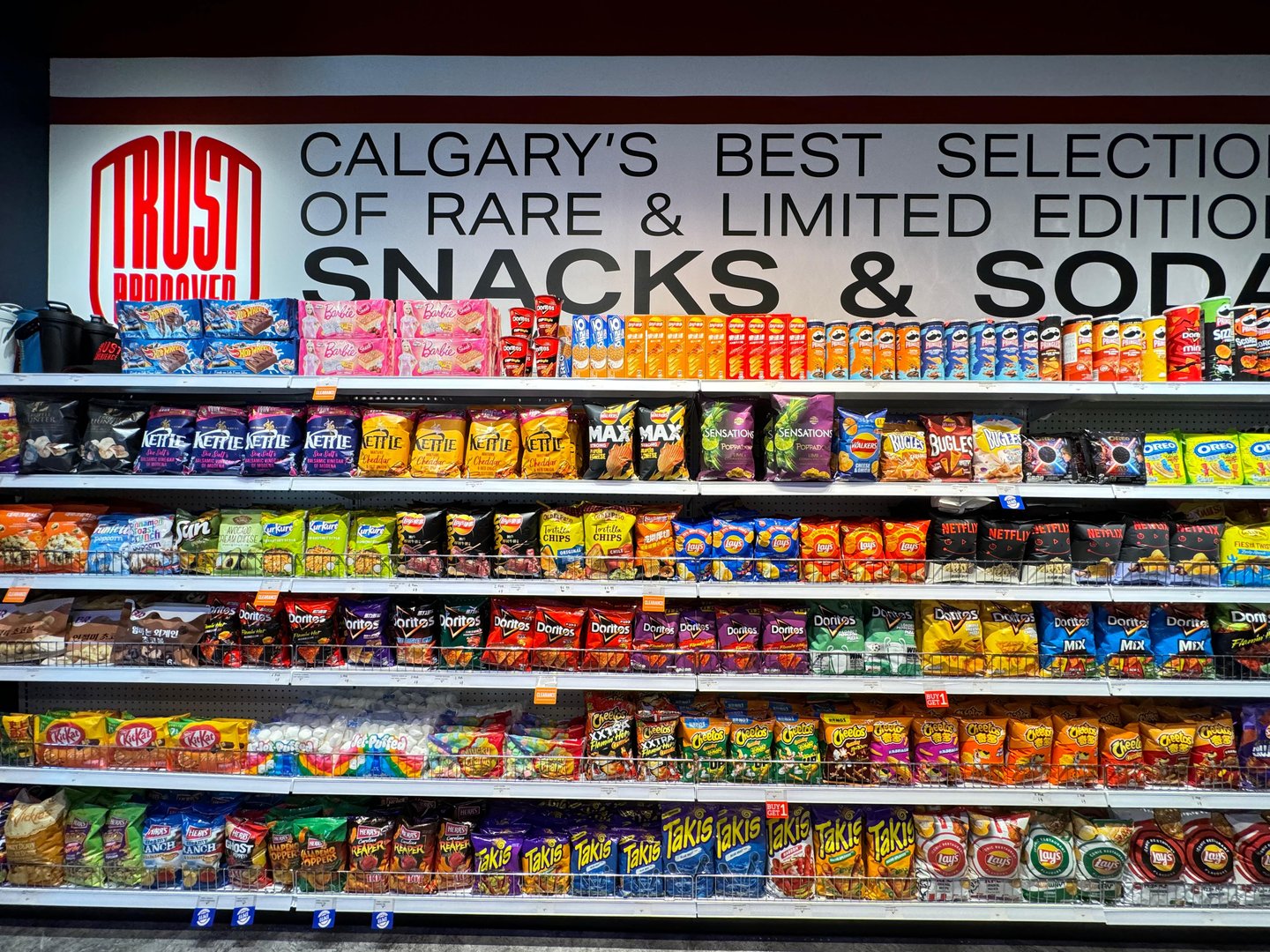Calgary's Trust Convenience debuts beer, wine and other alcohol beverages
Calgary’s Trust Convenience is billing itself as the first independent c-store in Alberta to have a liquor license, with the launch of a second location at 40 Christie Park View SW.
Opened in May, Trust Convenience’s new store dedicates 300 or so sq. ft.—about 25% of the footprint—to the refrigeration of beer, wine and spirits. “Our alcohol is selling really well so far,” says Trust Convenience owner Dharm Khosa. “We just received our second order of alcohol, and so product is moving. The response from customers has been very positive.”
7-Eleven Canada has been the primary, if only, c-store retailer in the province with liquor licenses. According to the 7-Eleven website, 15 of its Alberta stores currently sell beer and alcohol for dine-in or takeout, with 13 of those also offering delivery. In 2021, Alberta Gaming, Liquor & Cannabis (AGLC) removed “unnecessary restrictions on liquor sales,” enabling application from non-restaurants with a foodservice component (i.e., a designated dining area) to sell alcohol. This enabled 7-Eleven to break into the market.
READ: Slurpees and suds: 7-Eleven expands beverage alcohol program in Alberta
Khosa is thrilled with the customer feedback so far, given the challenging licensing process and equipment expense.
“It was an uphill battle, as we were new to it,” he says. “There was no guidance and no template that we were following as an independent, but we managed to navigate our way through it. Now we’re the first independent in Alberta to hold a liquor license.”
Alberta completes review into liquor sale expansion
Alberta could be the next province to allow the sale of alcoholic beverages in c-stores and grocery stores widely.
Following Ontario’s decision to expand alcohol sales, the government of Alberta said in April it would explore a similar move. An MLA committee was established to collect stakeholder perspectives on the effectiveness of the current model in serving the province and to identify potential areas for improvement.
“The MLA committee has recently met with grocers and liquor industry representatives to discuss the desirability of expanding liquor sales into grocery and convenience stores,” says Brandon Aboultaif, press secretary to Hon. Dale Nally, Minister of Service Alberta and Red Tape Reduction. “The MLA Committee has now concluded its work, and Service Alberta and Red Tape Reduction has begun to review the results. The results will be used to help inform how Alberta’s fully private liquor model can continue to support the best interests of both businesses and Albertans.”
He gave no timeline on when results of the review will be shared publicly.
In summer 2021, the Alberta government announced that the Alberta Gaming, Liquor and Cannabis (AGLC) was relaxing rules around alcohol consumption. This included allowing c-stores with a defined dining area to be treated like restaurants in applying for liquor licenses. 7-Eleven secured a license for a location in 2021, in Edmonton, which was described as a pilot for liquor sales. After the pilot was “well received by local patrons,” the chain has every year since added more stores to its alcohol beverage program.
(CSNC did reach out to AGLC to confirm this, however the organization could not verify and said in an email: “There are several businesses in Alberta that have a class A minors allowed liquor licensed premises located within their existing business. These locations operate in-store restaurants that offer a selection of alcohol beverages products to adult customers during limited hours, for consumption in a designated dining area of the store. These premises that operate cafés or restaurants with class A licenses within include convenience stores, specialty markets and other forms of business.”)
AGLC also had their concerns about an independent wanting to sell liquor, according to Khosa.
“It took them about six months to even get back to our initial inquiry,” he says.
Trust began the official application in December, and delayed opening the store until the license was secured almost six months later. “We were stressed about it, because we were paying the lease out of pocket,” says Khosa. “But we didn’t think it would have the same impact if we opened the store and introduced alcohol at a later date.”
Ultimately, Trust Convenience’s application (spearheaded by Lovepreet kaur bhatti, co-owner of Trust) was successful because of the store’s commitment to foodservice. The store has a self-serve Zumex fresh orange juice machine, a self-serve expresso bar with a Franke coffee machine, as well as a hot food menu including pizza and hot dogs. There is also a designated seating section for about eight patrons.
“Our future goal is to grow foodservice,” underscores Khosa.
Coolers were sourced with built-in locks that display the alcoholic product.
“Built-in locks are important, because theft is one of the biggest issues for independents and alcohol doesn’t have great margins. Keeping it locked also helps prevent accidental product damage,” he says. It also helps keep the product out of hands of minors. “Staff have to unlock it when a customer wants to buy product and we have a camera directed at the cooler, so we know exactly who is being sold alcohol.”
Staff who handle alcohol are ProServe trained, and Trust also adapted its POS systems to track age verification.
“Every time we scan an alcoholic beverage, we manually look at their ID and input their birthdate into the system,” explains Khosa. “We don’t keep their personal data, only birthdates so that if an AGLC inspector comes in and says, ‘I want to see all the alcohol sales on May 10,’ we can show the ages and demonstrate our commitment to being a responsible retailer.”
Trust didn’t initially plan to sell beer and liquor in the location. The first Trust store, which opened at the Savanna Bazaar shopping plaza in Calgary’s northeast in 2020 a week before the World Health Organization declared COVID-19 a global pandemic, made a name for itself selling rare and limited-edition snacks and sodas. In 2022, Trust took the back of that location and partnered with Pearl Cannabis to open a cannabis store, with a separate entrance at the back of the plaza.
“The Pearl Cannabis store has done well, so when we approached the Christie Park site, we asked about including a cannabis store and they said, ‘Look, the community here is older, a lot of them are retired and have grandkids they’d like to bring here.’ And so, we didn’t want to put a thumbnail into an area where it doesn’t belong,” explains Khosa. “That is when we thought about selling beer and wine because it’s a more mainstream product. The alcohol we carry very much caters to the community.”
The current selection includes Barefoot wines and 19 Crimes Snoop Dogg Cali Red; Stella Artois, Bud Light, Corona Extra, Blue Moon Belgian White and Alexander Keith’s; hard seltzers Happy Dad and White Claw; Arizona Hard Iced Teas; and Grey Goose vodka.
Most of its product is sold “in tall cans, because not everybody wants to pick up a 12-pack,” especially those trying a brand for the first time.
Khosa says they’re also looking to give cooler space to local breweries. “Because we are focused on tall cans, we can be a testing ground for brands and help them secure placement in other stores,” he notes.





